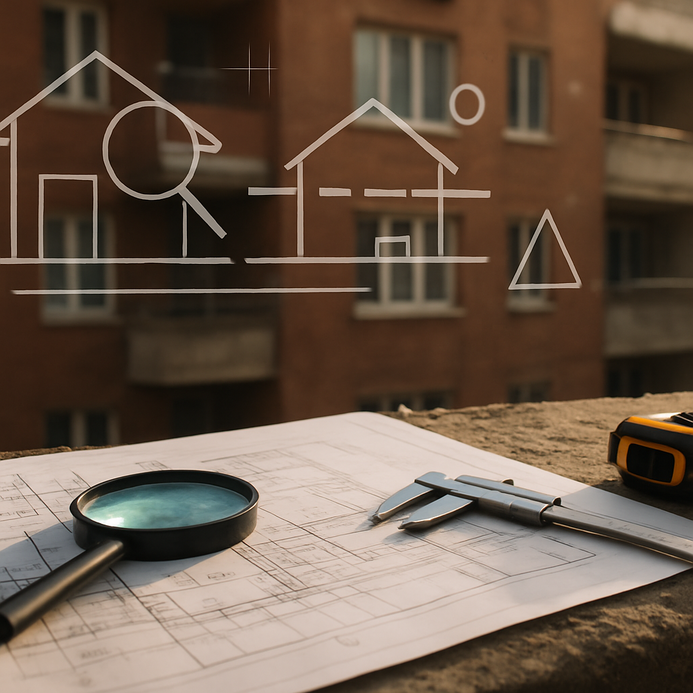Real Estate Buyer’s Guide: The Ultimate Resource For Right Investing
Buying a property, whether it’s your first home or an investment property, can be a significant decision. With so many factors to consider, such as location, budget, and property type, it can feel overwhelming to navigate the real estate market. However, with a solid understanding of the process and some guidance on what to look for, you can make a smart investment and find the perfect property for your needs. In this real estate buyer’s guide you’ll get to understand a few thumb rules about choosing the right property. So here is the cheat sheet for you to consider before investing in real estate.
These are the top 4 things to check, that only a real estate insider can tell you!
– Project Legality
– Developer Credibility
– Customer Finance
– Project Location

1. Project Legality
One of the first things to do is to check for the project legality. Performing due diligence and verifying the project’s legality is crucial before investing in real estate. By ensuring that the property complies with all regulations, you can make a safe and secure investment and avoid potential legal issues in the future. You need to look into the following to evaluate the project’s legality:
– Ownership documents
– Relevant project approvals
– RERA
Ownership documents:
Ask the developer for the following:
– TITLE DEED
This establishes the land ownership. If the land is owned by the developer, ask for the Sale deed, whereas if it is a Joint Development project then the Development Agreement cum General Power of Attorney (DAGPA) is needed.
– LINK DOCUMENTS
Link documents affirm whether the ownership of the land throughout was rightly transferred. Check the link documents for a minimum of 50 years to know about the rightful transfer of ownership
– LEGAL OPINION
It’s a synopsis of the entire land history from the ownership perspective. If there are any questions on the clarity of the title you could appoint a counsel to verify the same.
Check the legitimacy of these documents on the IGRS website by taking the document number of the title deed or the DAGPA.
Integrated Grievance Redressal System (IGRS)1 Telangana is the official website of the registration and stamps department for Telangana
Relevant project approvals:
Once you are satisfied with the ownership documents, the next step is to check if the project has appropriate approvals for construction. Here is a list of the approvals that you need to cross-check:
– Non Agricultural Land Assessment (NALA) Certificate: It converts the land purpose from agricultural to non-agricultural. Any land being developed for residential or commercial purposes has to have this certificate.
– Airport NOC: Needed for height clearance of the project.
– State Disaster Response & Fire Services Department NOC aka Fire NOC: Ensures that the project is being designed in compliance with fire safety protocols
– Environmental clearance: This is to confirm that the project follows environmental guidelines and is cognizant of the underground water levels of the area. This is applicable for any project which has 6
floors or more.
– Municipal approval: Ensures that the project is being designed in compliance with the building and development norms. Ask the developer for the proceeding letter, which captures the municipal body’s to permission to proceed with construction
– Labour cess: The developer has to pay 1% of the cost of construction as labour cess. Only once this is paid, they can start the excavation of the site.
TS RERA (Real Estate Regulations Act) Approval:
The Telangana State Real Estate Regulations Act (TS RERA) approval is the final and the most important approval that a developer needs. Every real estate project which has land area more than 500 Sq. mts or has more than 8 apartments needs to get TS RERA approval. The previously mentioned approvals are all prerequisites for TS RERA.
Once you have the TS RERA number, you can check the certificate on the TS RERA website. TS RERA safeguards your interests as a buyer.
Three of the main measures taken by TS RERA are:
– No diversion of project cash flows: Developers must mandatorily deposit the amount received from buyers into a separate project escrow account. They have to mandatorily maintain 70% of that amount and use it only to meet the operational expenses of the project.
– Buyers would be compensated in case of project delays: In case of project delays, RERA creates a compensation for the customers, to be paid by the developer
– Buyers can claim warranty in case of Building defect: In case of any structural defects in the property, it is the responsibility of the developer to fix the defects within a period of 5 years without charging the buyer.
2.Developer Credibility
Developer credibility can be estimated through the following:
1. Financial strength
2. Operational expertise
Financial strength:
Real estate is capital-intensive industry, where the developer needs financial help to build the project.
If they have opted for Construction Finance, then you need to know
– Which institution have they tied up with?
– What is the amount of construction finance raised?
Moreover, you must go to the developer’s website and check their other projects. If there are projects recently handed over, or approaching handover, that is a clear indication of the developer having surplus cash flow and being at a better financial footing.
Operational Expertise
Which consultants do they have on board?
Entire planning of a project involves a set of experts who play an important role in maintaining quality and structural accuracy, such as:
– Structural consultants
– Architects
– Landscape consultants
– Project Management Consultants
– MEP Consultants (for electrical works, plumbing, fire-fighting, etc)
Have they delivered projects of similar scale in the past?
A common mistake that people do is weigh the developers on the NUMBER OF YEARS OF ESTABLISHMENT instead of the SCALE OF THEIR PAST PROJECTS. It is important to check whether they have constructed similar projects as the one you are considering to invest in. This is a goodmarker of their capabilities to deliver a project of a similar magnitude.
3. Real Estate Buyer’s finance
There are also some financial eligibility criteria & benefits you need to be aware of. There are 2 things you need to do to understand your own financials better:
– Estimating your Loan Eligibility:
To arrive at your budget you need to get an idea about the amount of home loan you can take. Banks issue home loans based on your loan eligibility, which depends on the following parameters:
– Gross Income
– Tenure for loan
– Bank rate for home loans
– Current loan obligations
– You can have a quick estimation of your loan eligibility here.

– Capital gains and tax implications
It is important to understand Capital gains and other tax implications when you are going to invest in a real estate property. Capital gain is the profit you make from the sale of a property. The tax levied on this profit is called the capital gain tax, and it is a discounted tax rate.
If the property purchased is resold within 3 years from the date of sale deed, Short Term Capital Gains tax would be applicable (as per your income slab rate).
If it is sold after 3 years since the execution of the sale deed, then it will be considered as long-term asset, and long term capital gain tax @20% will be applicable.
And if you are selling your first and only residential property, you can be exempted from paying tax on the capital gains. You need to deposit the sale proceedings (including the capital gain) in a Capital gain account at a scheduled bank. After this, you have to use the entirety of the amount to purchase another property. This benefit doesn’t arise if you have multiple properties, and are selling one of them.
– TDS implications when you invest in a property:
Under section 194-IA of the Income tax Act 1961, if you are buying a property worth ₹50 Lakhs or more, 1% of the total consideration has to be deducted and paid as TDS to the authorities.
4. Real Estate Project Location
The location creates desirability, desirability creates demand, and demand raises real estate prices. Things to check are as follows:
– Roads and transport hubs such as flyovers, metro stations, both current and upcoming
– Current & future concentration of commercial spaces
– Schools and other educational institutes nearby
– Social infrastructure such as malls, hospitals, etc
In order to check the Government’s proposed plans, you can visit the Hyderabad Metropolitan Development Authority (HMDA) website3, where you can find information about proposed road networks

In conclusion, purchasing real estate can be a complex and daunting process. However, armed with the right information and guidance, you can make a smart investment and secure your financial future. This real estate buyer’s guide covered some of the most critical factors to consider when buying property, including project legality, developer credibility, customer finance, and project location. By taking the time to perform due diligence and investigate these factors, you can avoid potential risks and make an informed decision. We hope this guide has provided valuable insights and helped you feel more confident in your real estate buying journey. Good luck and happy house hunting!
Check out ASBL Spire, ASBL Springs and ASBL Spectra













